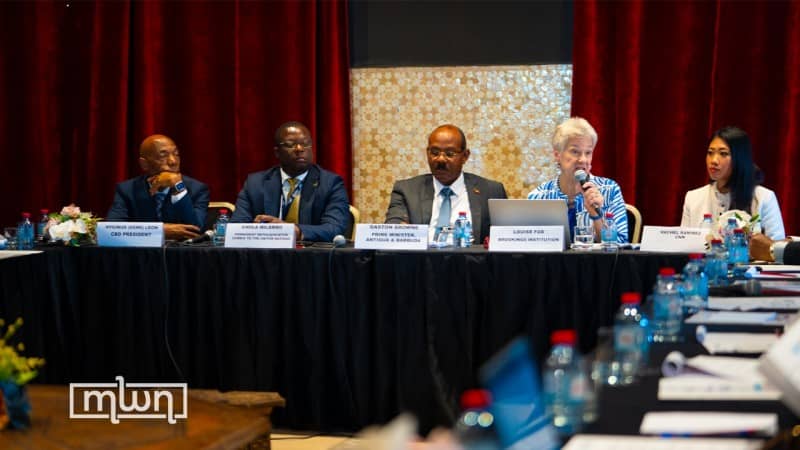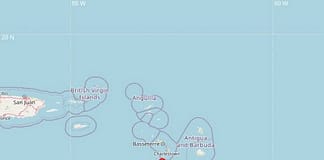
Marrakech – In the face of the consecutive crises rocking the world, a high-level UN panel held in Marrakech on Wednesday discussed new ways to evaluate countries’ vulnerabilities that go beyond simple income measurements.
The Multidimensional Vulnerability Index (MVI) aims to quantify countries’ vulnerabilities and lack of resilience, giving international financiers better data to prepare more impactful investments.
The index hopes to help give a better fighting chance to developing countries to withstand the upcoming environmental, social, and economic shocks that are undoubtedly heading their way.
The index was introduced in Marrakech on Wednesday, with a high-level panel comprised of Prime Minister of Antigua and Barbuda Gaston Browne, Permanent Representative of Zambia to the UN Chola Milambo, President of the Caribbean Development Bank Hyginus “Gene” Leon, and Brookings Institute’s Louise Fox.
Income is not vulnerability
A key point of contention for the panel, who were tasked with putting together the MVI, was that income should be seen as separate and different from vulnerability.
“For thirty years we have been telling the world that income and vulnerability are different things. The MVI is finally how we prove it,” Gaston Browne said, arguing that the international finance architecture needs to be urgently reformed so that developing countries can fight the inevitable coming shocks.
The biggest of these is climate change, many argue, especially since developing countries – particularly Small Island Developing States (SIDS) – are set to experience its biggest effects despite contributing very little to it.


While global finance over the past few decades fused the ideas of wealth and resilience (and in effect, poverty and vulnerability), the MVI aims to prove that line of thinking insufficient for the future of global finance.
While states like Qatar and Saudi Arabia are very wealthy, they are still considered highly vulnerable to environmental shocks, the panel argued, adding that the difference lies in their financial resources which makes it easier to build resilience.
Hyginus Leon echoed similar sentiments, saying that Gross National Income (GNI) “is not a proxy for prosperity,” as it ignores key elements that can indicate vulnerability.

A good basis
While vulnerability has not yet been normalized as an element to be considered by international finance organizations, the UN report serves as a good first step for this action to eventually be taken.
“I think if we’re able to as a global community come together to agree on the metrics and endorse it at the UN, we’ll be able to measure across different countries the vulnerabilities that are there,” Zambia’s Permanent Representative to the UN Chola Milambo told Morocco World News (MWN).
He emphasized that UN member states will now come together to review the initial report and agree with it, before it can formally be put to use in international finance institutions.

The index can be especially relevant to African countries, he added. Milambo detailed that the treatment of vulnerability as a new index to use in planning can help countries appropriately set aside resources and prepare for the inevitable shocks.
“The vulnerability index allows you to take measurement across a particular kind of shock and prepare for it and be informed around it,” he said.
Rabab Fatima, UN High Representative for Least Developed Countries, Landlocked Developing Countries and Small Island Developing States said the index could “revolutionize global development.”
That revolution could come from providing states and international financiers with a more nuanced understanding of vulnerability, allowing for more effective policies.

Quantitative indicators
The MVI is the first internationally recognized quantitative indicator of vulnerability, Technical Lead Louise Fox told MWN, as she explained how the index is measured and constructed.
The index is constructed around two main pillars, vulnerability and structural resilience, and three categories which are economic, social, and environmental shocks. The data within those categories is averaged into a country score.
“Why do we need to measure vulnerability? Don’t we measure enough things in this world?” she hypothetically asked, detailing that measuring vulnerability can help manage risks better.
“It’s important for developing countries to diagnose and measure their vulnerabilities, because if you don’t measure it, you can’t fix it,” she added.

Fox also emphasized that the scores and rankings themselves are not the most important aspect of the MVI.She called on stakeholders to look more specifically at states’ specific risks and needs.
The panel worked for 18 months on the index before launching it on Wednesday, with Fox hoping that the index can be both intuitive and bring a new focus on vulnerability as an important part of sustainable development.
The panel was held on the sidelines of the World Bank and International Monetary Fund’s (IMF) annual meetings in Marrakech, which have gathered over 14,000 participants from across the world to discuss pressing global financial matters.
Advertise with the mоѕt vіѕіtеd nеwѕ ѕіtе іn Antigua!
We offer fully customizable and flexible digital marketing packages.
Contact us at [email protected]
















Ok, I’ll try and give our ‘hide–he–self-away’ Prime Minister the benefit of of doubt, as he takes part in these “talks about talks” conference in Morocco 🇲🇦 and resolves what’s going wrong at home
What Antiguans will be looking forward to when Gaston Browne returns, is that he tackles our ongoing issues here in Antigua & Barbuda.
It’s an exhaustive list (before he dances abroad again), but he must do it on return:
1), Address the nation about RISING crime, like Sweden’s 🇸🇪 Ulf Kristersson did to his electorate
2), PAY outstanding wages, overtime and pensions immediately – no ifs or buts
3), Come out immediately, and declare transparency on all financial transactions that tax-payers Antiguans are still concerned with
4), What are your proposals for cleaning up St John’s once and for all (including the abandoned carpark)
5), Is the ongoing issues with Liat and their former employees solvable? If not, why not? Answers please
6), Will you allow your former boxing partner Asot Michael, back into parliament to represent his constituents sooner, rather than later?
7), Will you focus on helping Antiguans with the HORRENDOUS cost of living crisis once you return to our shores?
8), Will you also DIVERT the $2,000 wasted Dollars from the Alpha Nero super yacht to help fund Antigua’s vital services like the hospital or police?
9), Homeland security still needs to be addressed, and it starts with the REPLACEMENT of the current Head of the Immigration Department. Forthwith
10), Fund our police for more presence on our streets (including night patrols), and equipment to carry out their duties properly and in the correct manner
As you can see Prime Minister, from the above list of 10, you have plenty to deal with when you return from Morocco 🇲🇦.
If you deal with ONE of the 10 issues, at least it’s a start.
If you tackle HALF of these problematic situations, Antiguans will be ABSOLUTELY AMAZED and ASTONISHED; and if by some sort of MIRACLE you complete ALL 10, it MAY even restore your WANING credibility at home.
REDEEM YOURSELF PRIME MINISTER 🥸, PUT ANTIGUA FIRST!
Comments are closed.